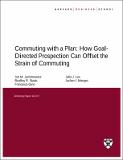| dc.contributor.author | Jachimowicz, Jon M. | |
| dc.contributor.author | Lee, Julia J. | |
| dc.contributor.author | Staats, Bradley R. | |
| dc.contributor.author | Menges, Jochen I. | |
| dc.contributor.author | Gino, Francesca | |
| dc.date.accessioned | 2016-02-23T15:47:20Z | |
| dc.date.issued | 2016-02-23 | |
| dc.identifier.citation | Jachimowicz, Jon M., Julia J. Lee, Bradley R. Staats, Jochen I. Menges, and Francesca Gino. "Commuting with a Plan: How Goal-Directed Prospection Can Offset the Strain of Commuting." Harvard Business School Working Paper, No. 16-077, January 2016. | en_US |
| dc.identifier.uri | http://nrs.harvard.edu/urn-3:HUL.InstRepos:25558708 | |
| dc.description.abstract | To get to work, employees need to commute. Across the globe, the average commute is 38 minutes each way per day. It is well known that longer commutes have negative effects on employees’ well-being and job-related outcomes. Yet, commuting may not similarly affect all employees, since some of them may naturally engage in behaviors to offset the negative effects of longer commutes. Drawing on psychological research on self-control, we theorize how engaging in future-oriented thinking about the tasks to complete during the workday (i.e., goal-directed prospection) while commuting to work influences work outcomes. Across two field studies and one field experiment, we find that individuals higher in trait self-control are less likely to report negative effects of longer commutes. While commuting, individuals with higher trait self-control engage in goal-directed prospection, partially offsetting the strain of commuting. In a field experiment, individuals asked to engage in goal-directed prospecting during commuting reported higher levels of job satisfaction and lower levels of emotional exhaustion. Although commuting is typically seen as the least desirable part of an employee’s day, our theory and results point to the benefits of viewing it as a useful time period to engage in goal-directed prospection. | en_US |
| dc.language.iso | en_US | en_US |
| dash.license | OAP | |
| dc.subject | Commuting | en_US |
| dc.subject | Prospection | en_US |
| dc.subject | Job Satisfaction | en_US |
| dc.subject | Emotional Exhaustion | en_US |
| dc.subject | Self-Control | en_US |
| dc.title | Commuting with a Plan: How Goal-Directed Prospection Can Offset the Strain of Commuting | en_US |
| dc.type | Research Paper or Report | en_US |
| dc.description.version | Author's Original | en_US |
| dc.relation.journal | Harvard Business School working paper series # 16-077 | en_US |
| dash.depositing.author | Gino, Francesca | |
| dc.date.available | 2016-02-23T15:47:20Z | |
| dash.contributor.affiliated | Gino, Francesca | |


